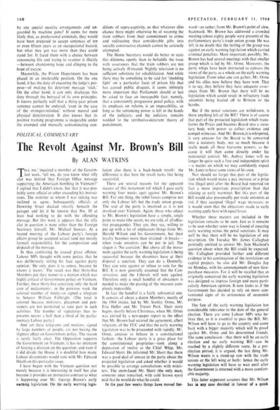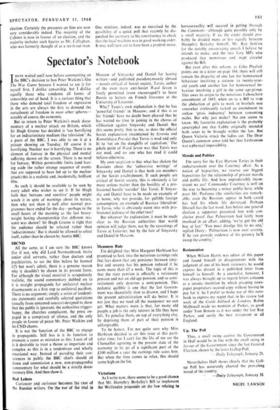POLITICAL COMMENTARY
The Revolt Against Mr. Brown's Bill
By ALAN WATKINS
"-TELL me,' inquired a member of the Govern-
' last week, 'tell me, do you know what silly clot was behind that Foreign Office message supporting the American bombing in Vietnam?' I replied that I didn't know, but that it was pro- bably some official or other exceeding his instruc- tions. The minister to whom I was talking was inclined to agree. Subsequently officials at Downing Street ducked smartly beneath the parapet and let it be known that No. 10 at least had nothing to do with the offending message. But this week it appears that the silly clot in question is none other than the Foreign Secretary himself, Mr. Michael Stewart. At a heated meeting of the Labour party's foreign affairs group he accepted actual (and not merely formal) responsibility for the composition and dispatch of the message.
In thus confessing he caused grave offence. Labour MPs thought with some justice, that he was deliberately setting his face against party opinion. 'He only does it to annoy, because he knows it teases.' The result was that thirty-five Members put their names to a motion which was highly critical of Government policy on Vietnam. Further, these thirty-five constitute only the hard core of malcontents: in the previous week the colossal number of ninety-six signed a telegram to Senator William Fulbright. (The total is colossal because ministers, placemen and pen- sioners are not permitted to take part in such activities. The number of signatories thus re- presents nearer a half than a third of the parlia- mentary Labour party.) And yet these telegrams and motions, signed by large numbers of people. are not having the slightest effect on Government policy. The reason is surely fairly clear. The Opposition supports the Government on Vietnam; it has no intention of forcing a division on the question; and even if it did divide the House it is doubtful how many Labour dissentients would vote with Mr. Edward Heath on this particular issue.
I have begun with the Vietnam question not merely because it is interesting in itself but also because it provides an instructive contrast to what is happening over Mr. George Brown's early warning legislation. On the early warning legis-
lation also there is a back-bench revolt : the difference is that here the revolt looks like being successful.
There are several reasons for the apparent success of this movement (of which I gave early warning four weeks ago) against Mr. Brown's Bill. For one thing, the rebel forces comprise not only the Labour left but the trade union group. The soul of the party is involved as it is not involved over Vietnam. Again, those who object to Mr. Brown's legislation have a simple, single point to make (the secret, we are told, of all effec- tive propaganda). They are, they say, willing to put up with a lot of unpleasant things from Mr. Harold Wilson and his Government, but their loyalty becomes more than strained—it breaks— when trade unionists can be put in jail. The slogan is 'No coercion.' But above all the move- ment against the early warning legislation is being successful because the dissenters have at their disposal a sanction. They can do a Donnelly. They can vote against or refuse to vote for the Bill. It is now generally assumed that the Con- servatives and the Liberals will vote against. Therefore only a small handful of abstainers is needed to make the passing of the measure com- pletely impossible.
In fact the handful is a fairly substantial one. It consists of about a dozen Members, mostly of the 1964 intake, led by Mr. Stanley Orme, Mr. Eric Heller and Mr. Trevor Park. Their story begins shortly before Christmas, when Mr. Orme was alerted by a newspaper report to the effect that Mr. Brown had secured the agreement, albeit reluctant, of the TUC and that the early warning legislation was to be proceeded with rapidly. Mr. Orme, anxious to behave in a constitutional fashion—the Labour party is a great place for the constitutional proprieties—took along a deputation of twelve to the Chief Whip, Mr. Edward Short. He informed Mr.'Short that there was a good deal of unease in the party about the projected legislation and asked whether it would be possible to arrange consultations with minis- ters. The stem-faced Mr. Short {the only man, someone once remarked, with cold brown eyes) said that he would do what he could.
In the past few weeks things have moved for-
ward—or rather, from Mr. Brown's point of view, backward. Mr. Brown has addressed a crowded meeting (about eighty people were present) of the parliamentary party's trade union group. He was left in no doubt that the feeling of the group was against an early warning legislation which carried criminal penalties. More important, possibly. Mr. Brown has had several meetings with that smaller group which is led by Mr. Orme. Moreover, the party whips have been instructed to canvass the views of the party as a whole on the early warning legislation. From what one can gather, Mr. Orme and his allies now believe they have won. That is to say, they believe they have adequate assur- ances from Mr. Brown that there will be no legislation which could result in refractory trade unionists being hauled off to Brixton or the Scrubs.
But if the penal sanctions are withdrawn, is there anything left of the Bill? There is of course that part of the projected legislation which trans- forms the Prices and Incomes Board into a statu- tory body with power to collect evidence and compel witnesses. And Mr. Brown, it is whispered, is very anxious for the Board to be converted into a statutory body, not so much because it really needs all these fearsome powers, as be- cause it will then come directly under his ministerial control. Mr. Aubrey Jones will no longer be quite such a free and independent spirit —a matter on which we may confidently expect Mr. Jones to have some views of his own.
Nor should we forget that part of the legisla- tion which would make a pay increase or a price rise illegal until after the Board had reported (in fact a more important prescription than that relating to early warning). But this part of the Bill would also presumably put trade unionists at risk if they accepted 'illegal' wage increases; so it would seem that the objections made to early warning apply here with equal force.
Whether these matters are included in the legislation remains to be seen. Just as it remains to be seen whether some way is found of enacting early warning minus the penal sanctions. It may well be that there will be no legislation of any description. On Tuesday Mr. James Callaghan pointedly omitted to answer Mr. lain Macleod's question about when the Bill could be expected. Mr. Callaghan provided further and different evidence in his continuation of the restrictions on capital projects. So also did Mr. Douglas Jay on Monday, with his announcement of new hire- purchase measures. For it will be recalled that as originally conceived the early warning legislation was designed to impress foreign and more parti- cularly American opinion. It now looks as if the Government has decided to rely on more con- ventional signs of its seriousness of economic purpose.
The fate of the early warning legislation has considerable relevance to the date of the general election. There are some Labour MPs who be- lieve that, as it is essential to pass the Bill, Mr. Wilson will have to go to the country and come back with a bigger majority which will be proof against Mr. Orme and his determined friends. The same conclusion—that there will be an early election and no early warning Bill—can be reached by a slightly different route. In a pre- election period, it is argued, the last thing Mr. Wilson wants is a stand-up row with the trade unions or the left wing or both: hence the early warning legislation will have to wait until after the Government is returned with a more comfort- able majority.
This latter argument assumes that Mr. Wilson has in any case decided in favour of a quick election. Certainly the pressures on him are now very considerable indeed. The majority of the Cabinet is now in favour of an election, and the majority includes such figures as Mr. Callaghan, who was formerly thought of as a see-it-out man. One minister, indeed, was so exercised by the possibility of a quick poll that recently he dis- patched his secretary to his constituency to check that the local machine was in good working order. 4t may well turn out to have been a prudent move.



































 Previous page
Previous page